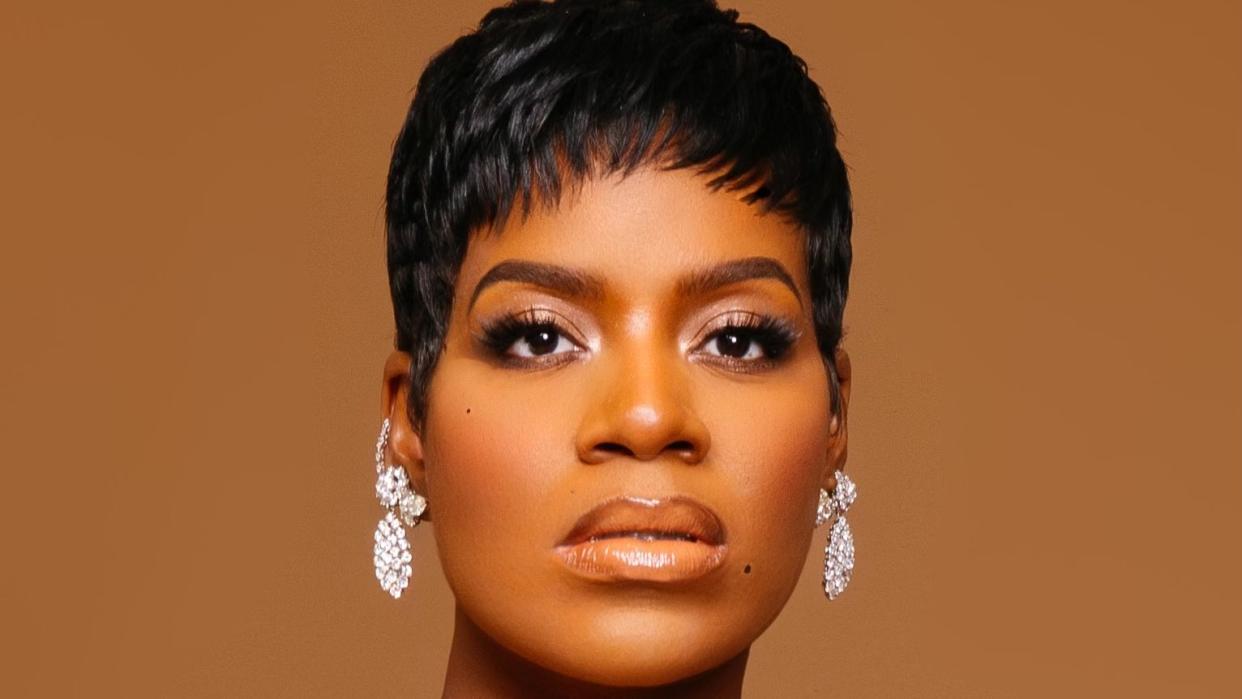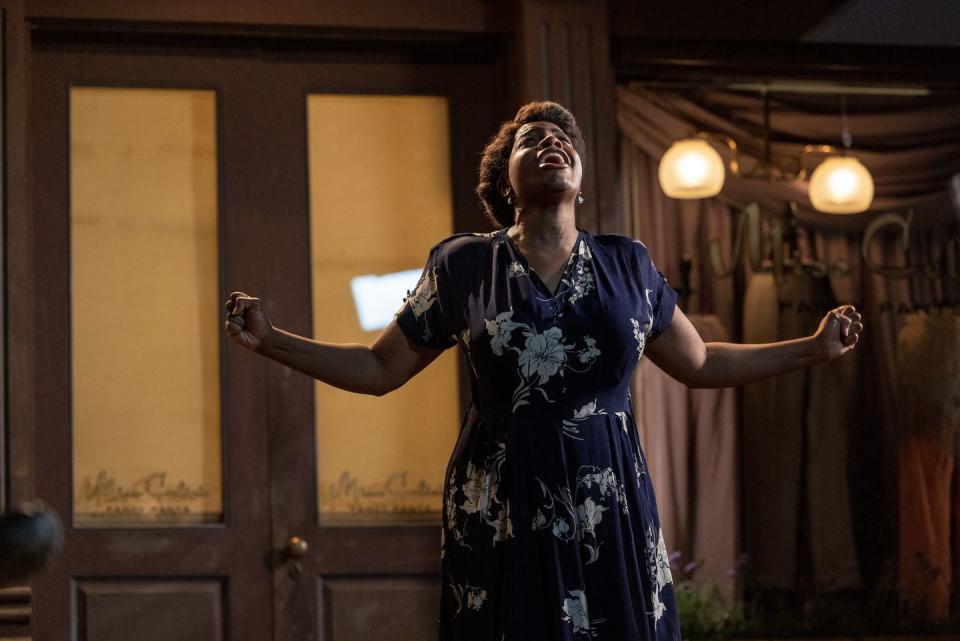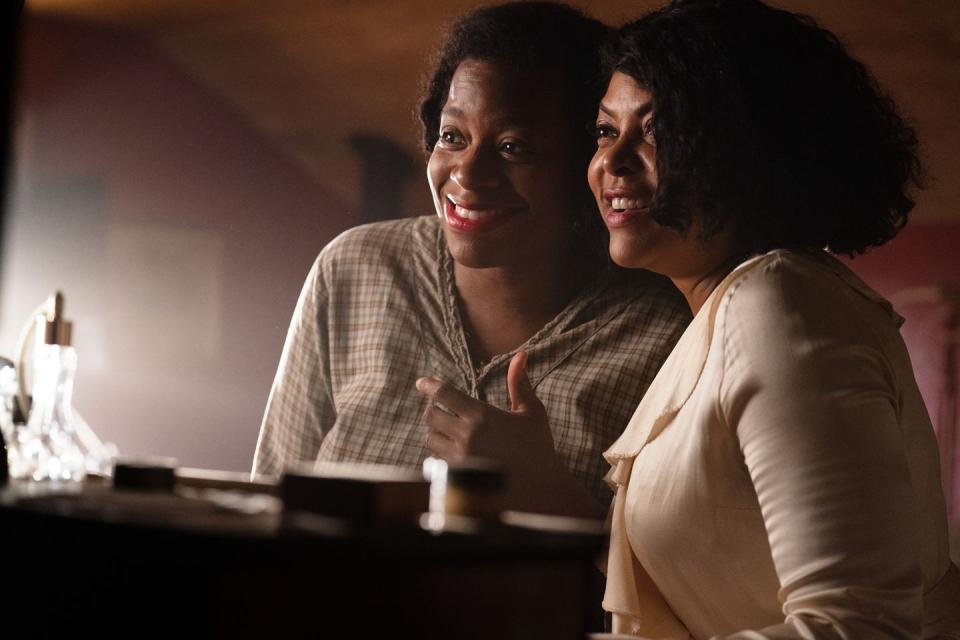Fantasia Barrino-Taylor Has Already Won

- Oops!Something went wrong.Please try again later.
"Hearst Magazines and Yahoo may earn commission or revenue on some items through these links."
For Fantasia Barrino-Taylor, returning to the character of Celie in The Color Purple—a character she knew well from her nine-month run on Broadway in 2007, and select dates of the show’s national tour in 2010—meant taking a risk. The Color Purple is a heavy story. Celie is a heavy role. Barrino-Taylor knew if she stepped into Celie’s shoes again, it wouldn’t be easy for her to put aside the story once filming stopped. But if there’s anything she holds dear, it’s her faith, so she put her faith in Celie once more.
"Celie became my therapist," Barrino-Taylor tells Harper's Bazaar right before the kickoff of awards season earlier this month. (That's not an exaggeration; the artist actually paused her traumatic therapy sessions in order to fully dedicate to the role.) "When I was on set, I would just sit with Celie and think. She actually allowed me to heal. On Broadway, I hated playing her all the time. Now, I have so much respect for her. She's elegant, she's classy, she's smart and bold and strong. And she's so forgiving. I think that we're missing a lot of that in the world today."
The Color Purple is, of course, one of the most formative Black stories of the 20th century. Originally a novel by Alice Walker, the story follows Celie's personal trials, centering the sisterhood and community that lift her up in her darkest moments. Walker went on to win a Pulitzer Prize for the book, and a 1985 adaption helmed by Steven Spielberg came soon after. It was nominated for a whopping 11 Academy Awards that year, though it won none. (Controversy has often followed The Color Purple, and some original cast members have suggested this may have hurt its initial award chances. The 1985 film ignited debates about its depiction of Black men; more recently, Walker herself has been accused of antisemitism.)
While there's no denying the film industry has been caught in a bit of remake fatigue, Barrino-Taylor believes that a new generation deserves to experience this story. Filmgoers seem to agree: the new film had the second-biggest Christmas box office opening in history following its release late last year. Barrino-Taylor and her costars Taraji P. Henson, Danielle Brooks, and Colman Domingo are all receiving well-deserved Oscar buzz for their performances.
"There's a lot of young girls that probably have not seen the first Color Purple and probably didn't get to experience it on Broadway either," she says. "They need to know that they are beautiful. They need to know that no matter what they have been through, you can still come out good as gold. That's what this story ultimately represents."
She specifically describes the making of the movie as "bloodwork." They filmed across the state of Georgia, where so much of the state's painful history surrounded the cast and crew. "This story taps into so much of our ancestors. We were filming on land still had slave houses. We could feel this stuff," she explains. "Taraji would look over at me and say, 'If only this land could speak.' We had to push through that. That was not easy."

Barrino-Taylor hasn't been shy about sharing how her story runs parallel with the character she's embodied. Even after winning the third season of American Idol in 2004, the star faced a myriad of personal and professional battles including financial woes, mental health struggles, and heightened scrutiny on her personal life. Now, looking back 20 years on, she sees her challenges as necessary hurdles that have brought her to this moment and given her the strength to take on Celie one more time. She was so dedicated to the process of acting as therapy, she even refused a stunt double for the film's more flinching scenes.
"It was brave and it was scary at the same time, but I just knew I had to stay be in that headspace," she says. "I had to do this for me—that's what I told Colman [Domingo] during our scenes together. I just had to let go of certain things from my past."
What our mothers and aunts and grandmothers have likely glossed over in the decades since the book's publication is that The Color Purple, along with being a story about Blackness and womanhood and generational trauma, is also a queer text. Some have argued that the 2024 iteration, directed by Blitz Bazawule, doesn't take a bold enough approach to the relationship between Celie and Shug (Taraji P. Henson). For Barrino-Taylor, it's not so much about boldly declaring what Celie and Shug are or aren't; the focus remains simply on how they saved each other.
"This is such a big, Black, story," the actor says. "And I'm very overprotective over Celie. But I will say Shug Avery was the first person to show Celie love. It could have came in jeans or a skirt. She was the first person to put a mirror in front of her face and say Do you see what I see?"

"It's one of those movies that's going to be talked about forever—whether good or bad, people are always going to have an opinion about something," she adds, regarding the social media commotion surrounding the film. "I do think it's all deeper than just having an opinion. It's about dealing with trauma and the things that hinder us from our future."
If there's only one theme that Barrino-Taylor has continued to visit throughout the process of returning to The Color Purple, it's been the act of forgiveness—specifically with herself. She's spent two decades in an industry that's tried multiple times to count her out, and when she looks back now, she's stopped being critical of her early mistakes. They were lessons that eventually turned into hidden blessings. She's focused on the future, but she's not fixating on it; if the right film comes along, sure, she'll act again. She wants to make a gospel album and dedicate it to her grandmother. She's officially a licensed sommelier and will be releasing her own varietal soon. She's definitely not thinking about EGOT-ing. That's missing the point of the personal peace she's worked so hard to give herself.
"At the start of my career, I was so young. I was 19 years old. Everybody in my life was coming and going so fast, money coming and going so fast. And me being a young girl from High Point, North Carolina who loved to sing, I wasn't educated in this thing called 'the industry,'" she says. "That took a toll on me and I lost a lot. Now—I turn 40 this year, which I'm excited about—I sit back and look at my life and I just laugh."
"I can either cry or laugh, but there's nothing to cry about anymore," she continues. "To be sitting here today? I've already won."
You Might Also Like

